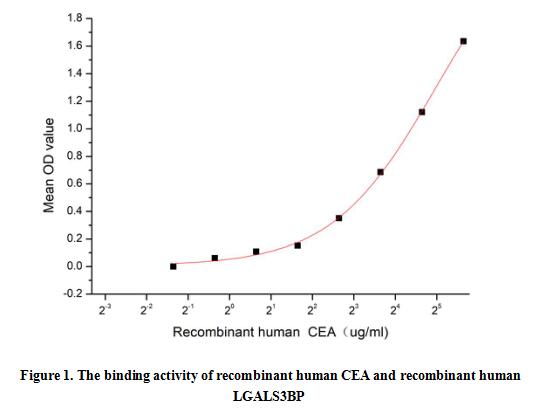Active Carcinoembryonic Antigen (CEA)
CD66E; CD66; CEACAM5; Carcinoembryonic Antigen-related Cell Adhesion Molecule 5; Carcinoembryonic Antigen
- Product No.UAPA150Hu61
- Organism SpeciesHomo sapiens (Human) Same name, Different species.
- Buffer FormulationPBS, pH7.4, containing 5% Trehalose.
- TraitsFreeze-dried powder
- Purity> 95%
- Isoelectric Point5.4
- ApplicationsCell culture; Activity Assays.
- Download Instruction Manual
- UOM 10µg50µg 200µg 1mg 5mg
-
FOB
US$ 160
For more details, please contact local distributors!US$ 400
For more details, please contact local distributors! US$ 800
For more details, please contact local distributors! US$ 2400
For more details, please contact local distributors! US$ 6000
For more details, please contact local distributors!
ACTIVITY TEST of the Active Carcinoembryonic Antigen (CEA)

Carcinoembryonic antigen (CEA), as one of the common tumor markers, is a human glycoprotein involved in cell adhesion and is expressed during human fetal development. Since the birth of human, CEA expression is largely inhibited, with only low levels in the plasma of healthy adults. Generally, CEA will overexpressed in many cancers, including gastric, breast, ovarian, lung, and pancreatic cancers, especially colorectal cancer. The lectin galactoside-binding soluble 3 binding protein (LGALS3BP) is also a secreted, which was first identified as cancer and metastasis associated protein. LGALS3BP has been identified as an interactor of CEA, thus a functional binding ELISA assay was conducted to detect the interaction of recombinant human CEA and recombinant human LGALS3BP. Briefly, biotin-linked CEA were diluted serially in PBS, with 0.01% BSA (pH 7.4). Duplicate samples of 100 ul were then transferred to LGALS3BP-coated microtiter wells and incubated for 1h at 37℃. Wells were washed with PBST 3 times and incubation with Streptavidin-HRP for 30min, then wells were aspirated and washed 5 times. With the addition of substrate solution, wells were incubated 15-25 minutes at 37℃. Finally, add 50 µl stop solution to the wells and read at 450 nm immediately. The binding activity of CEA and LGALS3BP was shown in Figure 1, and this effect was in a dose dependent manner.
USAGE of the Active Carcinoembryonic Antigen (CEA)
Reconstitute in 10mM PBS (pH7.4) to a concentration of 0.1-1.0 mg/mL. Do not vortex.
STORAGE of the Active Carcinoembryonic Antigen (CEA)
Avoid repeated freeze/thaw cycles. Store at 2-8°C for one month. Aliquot and store at -80°C for 12 months.
STABILITY of the Active Carcinoembryonic Antigen (CEA)
The thermal stability is described by the loss rate. The loss rate was determined by accelerated thermal degradation test, that is, incubate the protein at 37°C for 48h, and no obvious degradation and precipitation were observed. The loss rate is less than 5% within the expiration date under appropriate storage condition.
INCREMENT SERVICES
BCA Protein Quantification Kit
Molecular Mass Marker for Protein
Monoclonal Antibody Customized Service
Polyclonal Antibody Customized Service
Protein Activity Test Experiment Service
Electrophoretic Mobility Shift Assay (EMSA) Experiment Service
Buffer
Lentivirus Packaging Experiment Service
Adenovirus Packaging Experiment Service
Real Time PCR Experimental Service
Spike RBD Protein (S-RBD)
Protein G
Protein A



